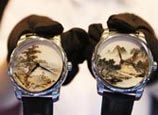
Edited and translated by Liang Jun, People's Daily Online
While tension has been high on the Korean Peninsula situation for several months, recently there have been some encouraging signs.
On June 16, the Democratic People's Republic of Korea (DPRK) proposed high-level talks with the United States and expressed its willingness to achieve denuclearization.
On June 19, a strategic dialogue between the foreign ministries of China and the DPRK was held in Beijing. During the course of these talks, DPRK First Vice Foreign Minister Kim Kye Gwan said the denuclearization of the Korean Peninsula had been the aim of late leaders Kim Il Sung and Kim Jong Il.
He also said the DPRK was willing to hold dialogue with other interested parties and was willing to engage in any form of contact, including six-party talks, in the hope of resolving the nuclear issue peacefully through negotiation.
On the same day, to further the DPRK's proposed high-level talks with the U.S., South Korea's newly-appointed chief envoy to the six-party talks, Cho Tae-yong, left for Washington to meet with his U.S. and Japanese counterparts.
It seems that the time is ripe for dialogue on the Korean Peninsula issue. However, there remain fundamental differences on the stance and the intentions of the parties involved. And mutual trust, the basis of any dialogue, is fragile.
There has been no significant shift in U.S. policy towards the DPRK. Firstly, the U.S. has emphasized that it will continue close and extensive cooperation with Japan and South Korea in response to the DPRK's "provocation", and will not reach any unilateral agreement with the DPRK. Regarding the DPRK's proposal to reopen dialogue with the U.S., the trio have stressed they will judge the DPRK by actions, not by words.
Secondly, it is unlikely that the U.S. will abandon its plans to increase its military presence in the Asia Pacific region. It remains committed to establishing a permanent anti-missile system development in the region.
Finally, the U.S. has repeatedly underlined it would never accept DPRK's "blank check", or make any concessions under duress. The U.S. precondition for any talks remains this: there needs to be a fundamental shift in the DPRK position.

Read the Chinese version: 半島事態演變迎來關鍵節點(望海樓)
Source: People's Daily Overseas Edition; Author:Su Xiaohui
















 Childhood in an isolated sterile room
Childhood in an isolated sterile room


![]()
